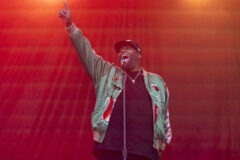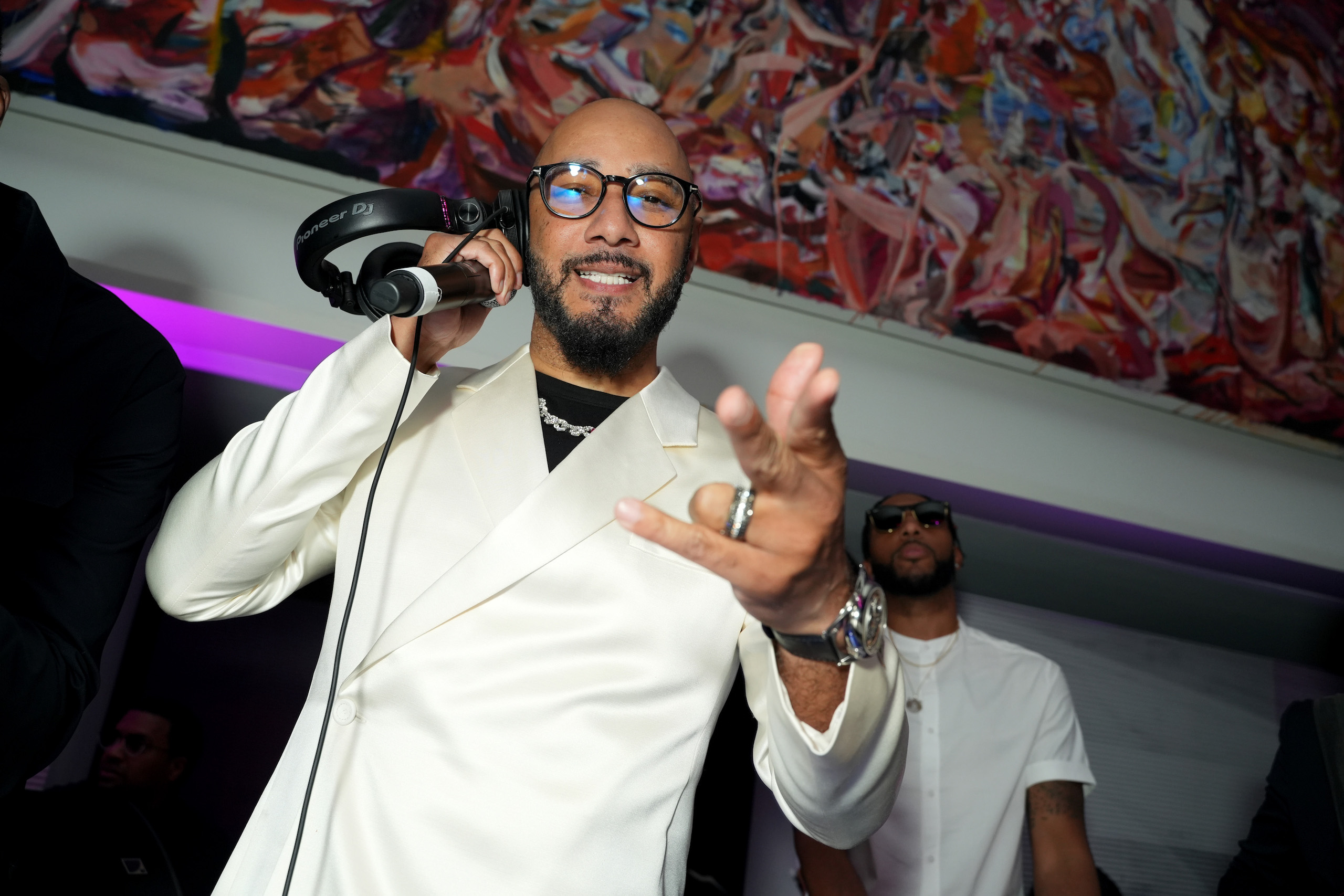Swizz Beatz is the blueprint for any artist stepping into the music business at a young age, filled with ambition and vision, and grinding their way to the top.
As a teenager in the late ’90s, he started making beats for artists on the Ruff Ryders label, aiming to shift the sound of hip-hop to the pavement. The strategy worked: Beatz helmed 1998’s “Ruff Ryders’ Anthem” — a beat DMX didn’t like at first and only rapped on because he lost a bet — and that determination to develop his sound eventually made him a sought-after producer. He was behind classics like N.O.R.E.’s “Banned From T.V.” and even worked on the majority of Eve’s 1999 debut, Let There Be Eve…Ruff Ryders’ First Lady.
Swizz Beatz continued to build up his cultural capital: Refining his minimalist sound through sharp, needling electronics and signature ad-libs, he churned out collaborations with giants like Jay-Z, Beyoncé, Drake, Kanye West, Busta Rhymes, and Lil Wayne.
Outside of music, Beatz is known as an avid traveler, art collector, global creative director, and owner of a camel racing team in Saudi Arabia. Swizz Beatz, the creator, is always about disrupting the norm.

Also Read
QUOTE/UNQUOTE
SPIN: Hip-hop is celebrating 50 years. It’s also celebrating that you’ve been doing this for 25 years. What has hip-hop taught you?
Swizz Beatz: Hip-hop taught me that there are never limits on ways to express your craft. Hip-hop is an art and an expression, as well. It taught me that the sky’s not the limit — it’s just the view. If you put your mind to it, you can do it. Look at where all the hip-hop artists are in the genre. Compared to any music, hip-hop comes from the lowest starting point, and for it to be the highest genre of music right now for many years is insane. Most of the artists in hip-hop come from nothing.
When you were younger and starting out, did you ever think you would reach icon status?
No, I wasn’t thinking about no type of status. I was having fun doing music. I was having fun just being creative and not giving up, always. I never thought about fame and stuff like that. That was caught later, like, “Oh you should have this, or you should get that, or you did that, so that makes you this.” I was already having a good time in the streets with my family, my friends. I was already DJing parties. I was already having a good-ass time. When the music stuff kicked in, it was just a plus. I didn’t even know you could make money from music. I already felt like I won a long time ago just from doing what I love and people loving what I was doing — even on the local side of it, so to go national and global with it is a plus and blessing.
Do you think “Ruff Ryders’ Anthem” is a defining moment in your career?
One thousand, billion, trillion percent. That’s my favorite song I ever produced because it changed my life, my family’s life, DMX’s family’s life, DMX’s life, and it changed a lot [of people] that was into the music’s lives. Even at the BET [Awards] afterparties, they played “Ruff Ryders’ Anthem,” and that crowd acted like DMX was on that stage, screaming at the top of their lungs. It’s insane to see something that was made in ’98 get shouted in 2023.
Is it still hard for you to listen to after the loss of DMX?
That song is very tricky because I heard it the other night in the club and started crying. There was another performance that I seen it on, and I just broke down crying. My son was there. I was like, “Man, I thought I was good.” But then I realized that you’ll probably never gonna be good from losing a friend. That’s probably never going to be easy. You gotta allow yourself to heal. We play tough as men, and we play tough ‘cause we are from the streets. Busta Rhymes crying on that [BET Awards] stage, that was a very manly, solid thing, and it is okay. I’m allowing myself to naturally get over what I’m feeling. When it hit me, I’ma cry. If I feel like that, that’s how it is going to be. I’m not gonna run and duck, like, “Aw, man, I’m so tough, I can’t cry.” I think it is weak if you don’t allow yourself to express yourself.
What’s been your approach in keeping DMX’s name alive as the custodian of his legacy?
For me, X’s impact was positive because he represents the have-nots. You never really see X in a Lamborghini, in a bunch of jewelry, and different things like that. X was very charitable with his efforts, with his time, with his money. A lot of his bad boy image took place [in the media]. X was a super gentleman, a super sweetheart, and a kid at heart. I loved that he played with remote control cars. I loved that he liked to play video games, play pool all day. He never let his inner child leave him. But then also, was he able to live as a child through the hard upbringing? DMX’s inspiration is amazing. I think he is one of one, none before, none to come. X is very, very serious.
We can break down your runs in production in eras: the Ruff Ryders era, the early 2000s Swizz, and the mid-2000s/2010s takeover. What drives you to reinvent yourself after every run?
For me, I just like being different. If I can be different and unpredictable — it’s like my favorite territory. If I can be unpredictable, we are in a good space. Like, “Nobody thought of coming with this sound.” Huh? So let me come with this sound. I like the mystery of it all still. I love that people didn’t expect me to come with [his latest EP] Hip Hop 50: Vol. 2 and Jay Electronica and all those different things. There’s no way possible for me to predict. I couldn’t even predict it. [Laughs.]
In 2011, you won a Grammy for Best Rap Performance by a Duo or Group with Jay-Z for “On to the Next One.” What do you remember about The Blueprint 3 sessions?
“On to the Next One” was a song that I had for my personal album that I was making as my departure from music. I feel that I’d done enough at that time, and I was going on to my next ventures with people already got to see, which were in art, designing watches, fashion, and the automotive space. That was me saying bye and onto the next endeavors and ventures in my life. And so Jay called me and was like, “Man, I’m wrapping up the album, and I need one of them … I need some energy!” I was like, “Okay, alright. You know what? I’m only going to send you one song. I’m going to send you one song, and if that song doesn’t work, maybe it is not meant for me to work on this particular project with you.” And he was like, “Cool.” Sent him “On to the Next One.” He called me back going crazy, and we finished that song so fast. It was done quick. From that to the Grammys.
Speaking of your solo work, talk to me about 2007’s “Top Down.” That’s one of my favorite songs to hear driving around Liberty City in GTA IV.
Man, people love “Top Down.” I’m not gonna lie, I never really gave “Top Down” the love it deserves. I don’t know why. But when I perform “Top Down,” they go crazy. It’s crazy on TikTok. People love “Top Down” in a crazy, quiet, wild type of way. It’s one of the secret weapons.
What’s your advice to younger producers starting out and wanting to build their own legacy?
I think my advice to younger producers is to create a sound so that people know that it is them. They gotta remember people are going to know who the artist is because it is the artist. But as a producer, you should create your own legacy as an artist as well. The producer, and the artist, it is all under art. I think people creating their own identity and their own sound [is good]. Although people might be like, “Oh, this sounds the same, that sounds the same.” The fact that you know it is me and you saying it sounds the same? I already won. People are like, “Oh, can you change this?” No, it is the sound. I’ve been in this business since ’98 because of a sound. Not because of my outfit. There’s a big difference. It’s because of a sound, an energy, and a presence. This is important for longevity.




